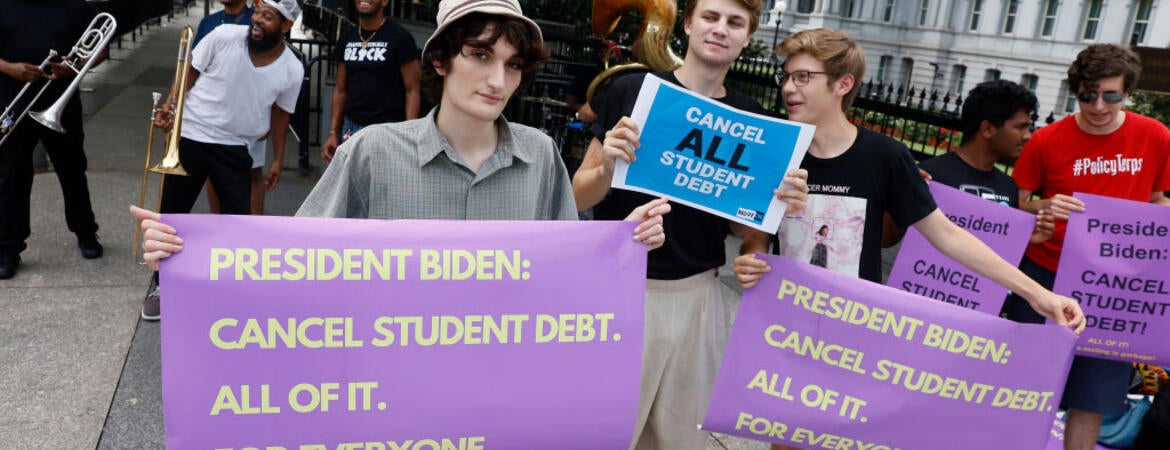
On Wednesday, President Joe Biden announced a student loan debt program that would forgive $10,000 in debt for borrowers who earn less than $125,000 and an additional $10,000 for those who received Pell Grants. Many borrowers are celebrating the liberation from debt that — for some — has prevented them from buying homes and setting aside savings. Distinguished Professor of Sociology and Public Policy Steven Brint, author of "Two Cheers for Higher Education - Why American Universities Are Stronger than Ever And How to Meet the Challenges They Face," represents here concerns that student loan forgiveness is inequitable.
For the Sept. 1 issue of UCR Life, UCR financial aid experts will discuss the details of the Biden administration's decision.
Q: Is forgiveness inequitable? How about people who didn’t go to college because they couldn’t afford it? How about those who paid back their loans?
In my view, debt forgiveness is inequitable. Approximately two-thirds of high school graduates start a post-secondary education program and about one-third eventually complete a four-year degree. The two-thirds of people who never start a program or never complete a four-year degree are usually — not always, but usually — the ones who are struggling financially.
Wouldn’t government aid be better spent on them?
At the same time, I am sympathetic to college students whose majors or institutions do not provide effective means for paying back loans. Some population groups still also suffer from discrimination in the labor market. So, speaking solely in economic terms, if you are a minority male who majors in child development or social work at an open-access institution, you may not be better off with a college degree than you would be going straight to work after high school.
President Biden’s plan does target loan forgiveness toward groups whose incomes have remained low after college and those who have taken out Pell Grants. That’s better than blanket relief for everyone with student loan debt.
But even so there are reasons for concern about this policy. The administration has not demonstrated that this spending is warranted at this time when the country is still experiencing high levels of inflation. And we should also take into account the large array of government programs that already allow borrowers to delay repayment or to make their repayments conditioned on their incomes so that repayments are low when their incomes are low.
The politics of the policy are also debatable. In my opinion, this announcement is being made for transparent political purposes — in an effort to energize midterm voting among younger and highly educated people with debt. This may be in the interests of Democrats who increasingly rely on young and college-educated voters. However, there may be an equal or even stronger backlash among working-class people who vote Republican and wonder why college grads who are already relatively privileged are getting this additional benefit. We might expect some opposition also among those who have worked hard to pay off their student loan debt and wonder why expectations for repayment have suddenly changed.
Q: A statement heard on a student loan panel at a Higher Education conference recently: “If we forgive this debt today, people will borrow tomorrow and we will be right back where we are.” Do you agree?
Borrowing has actually gone down a little in recent years, largely because the rampant borrowing promoted by for-profit higher education institutions has been exposed as predatory. But the basic point holds; without checks on college costs or other remedies for the cost problem, students will either stop trying to go to college or they will have to borrow more over time.
Q: Some argue student loan debt is the symptom and not the problem, the problem being the cost of higher education.
I do partially agree with this argument. The costs of college have stabilized somewhat in recent years, but they remain high.
There are complex reasons for this. Increasing costs are driven in large part by the growth of administration. Most of this growth is necessary to meet increased regulatory burdens, new constituency outreach efforts, new expectations for student services, and other changing expectations about what colleges should do. Student demand is also a factor in cost increases. Students like state-of-the art dormitories and recreation centers and colleges feel the need to supply them to remain competitive.
Colleges are very aware of the need to reduce costs and have tried a number of mechanisms to reduce them. But most of the savings are plowed back into programs faculty or students want. It doesn’t look like it will be possible to control most of the causes for cost increases.
On the revenue side, states could start supporting public higher education at a higher level than they currently do. That would reduce tuition costs. And it’s nice to see California stepping up to the plate this year. But most states tend to cut higher education spending during recessions and then never bring it back up to previous levels. They have a lot of other responsibilities and they tend to reduce higher education when it is expedient to do so because colleges and universities can also rely on household contributions in the form of tuition and fees.
The other option is to look to other financial aid reforms such as doubling the size of Pell Grants or making all loan repayment contingent on earnings. In my writings and speeches, I have advocated these two financial aid reforms. Pell Grants, which are targeted to the students who need financial aid the most, have not kept up with costs. Several countries including England do have income-contingent loan repayment, and it would not take a huge amount of effort to institute it in a comprehensive way in the U.S.
Q: Proponents of student loan forgiveness point to government bailouts of the automotive, banking, and airline industries, questioning why individual bailouts are opposed when industry bailouts sailed through Congress. Do you see a point in this assertion?
The difference is that these industries employ tens of thousands of people so bankruptcies impact a very large number of people who had no responsibility for the problems encountered by the industry.



